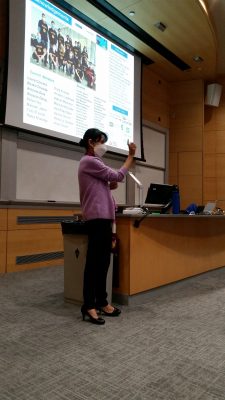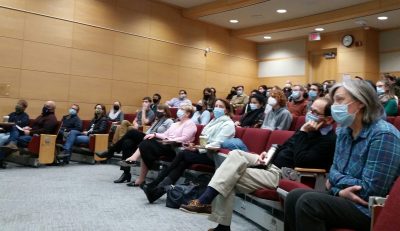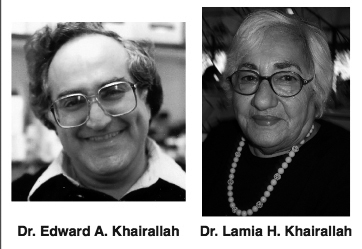MCB presented the 2021 Khairallah Symposium on Tuesday, November 16.
This year’s guest speaker was Dr. Ana Maria Cuervo, Professor of Developmental and Molecular Biology and of Medicine, Albert Einstein College of Medicine, and co-director of the Einstein Institute for Aging Studies.
 Faculty and students filled the lecture hall for the in-person event and were excited to hear Cuervo’s talk entitled, “Targeting Selective Autophagy in Aging and Age-related Diseases” Cuervo described her talk saying, “We are interested in understanding the mechanisms and consequences of the age-dependent malfunctioning of autophagy, one of the components of the proteostasis network”. She described her recent findings on the molecular regulators of a selective form of autophagy, the novel physiological regulatory functions identified for this process, the consequences of the functional decline of this type of autophagy with age and some of her lab’s current efforts to enhance its activity in vivo in the context of different age-related diseases.
Faculty and students filled the lecture hall for the in-person event and were excited to hear Cuervo’s talk entitled, “Targeting Selective Autophagy in Aging and Age-related Diseases” Cuervo described her talk saying, “We are interested in understanding the mechanisms and consequences of the age-dependent malfunctioning of autophagy, one of the components of the proteostasis network”. She described her recent findings on the molecular regulators of a selective form of autophagy, the novel physiological regulatory functions identified for this process, the consequences of the functional decline of this type of autophagy with age and some of her lab’s current efforts to enhance its activity in vivo in the context of different age-related diseases.
Dr. Ana Maria Cuervo obtained her M.D. and Ph.D. in biochemistry and molecular biology from the University of Valencia (Spain) and received postdoctoral training at Tufts University in Boston. In 2002, she started her laboratory at Albert Einstein College of Medicine, where she is now co-director of the Einstein Institute for Aging Research.
She is a recognized leader in the field of protein degradation and the biology of aging for her work on the impact of autophagy on aging and age-related disorders, with an emphasis in neurodegeneration.
Dr. Cuervo has been the recipient of prestigious awards, including the P. Benson Award in Cell Biology, the Keith Porter, the Nathan Shock, the Vincent Cristofalo, the Bennett J. Cohen in Aging Biology, the Marshall Horwitz Prize, and the Saul Korey Prize in Translational Medicine. Dr. Cuervo has delivered prominent lectures such as the Robert R. Konh, the NIH Director’s, the Roy Walford, the Feodor Lynen, the Margaret Pittman, the SEBBM L’Oreal-UNESCO for Women in Science, and the Harvey Lecture.
Dr. Cuervo is an elected member of the Valencian Royal Academy of Medicine, the Spanish Royal Academy of Sciences, the American Academy of Arts and Sciences and the National Academy of Sciences.
To learn more about Dr. Cuervo and her research, visit
Experimental: https://pubmed.ncbi.nlm.nih.gov/33891876/
Review: https://pubmed.ncbi.nlm.nih.gov/34563704/
https://sites.google.com/view/cuervo-lab/
The bi-annual symposium was Sponsored by the Dr. Edward A. Khairallah and Dr. Lamia H. Khairallah Fund for Scholarship. The mission of the Fund is to support scientific endeavors in the Department of Molecular and Cell Biology and in the School of Pharmacy by underwriting scientific symposia and by providing fellowship support to undergraduate and graduate research fellows.
Fund for the Scholarship was established in 1997 in honor of Dr. Khairallah’s contribution to teaching and research at the University. In 2014, the Fund was renamed to honor the equally enduring scientific contributions of Dr. Lamia H. Khairallah.
For nearly two decades this Fund has, on alternate years, supported student research and scholarly colloquia at the University of Connecticut. The Khairallah Fellowships have provided summer support for undergraduate and graduate students in the Department of Molecular and Cell Biology and in the School of Pharmacy, whose research projects are in the general fields of biochemistry, cell biology, and toxicology. The Khairallah Symposia continue to bring internationally recognized scholars, clinicians, and researchers to the UConn Storrs Campus to share their cutting-edge work.
 Dr. Edward Khairallah earned his master’s degree at Harvard University and did his doctoral training at the Massachusetts Institute of Technology. He then performed his postdoctoral research with a fellowship in the lab of Dr. Henry Pitot at the McArdle Cancer Research Institute at the University of Wisconsin. In 1967, he joined the faculty at the University of Connecticut. He was an internationally recognized researcher in the areas of protein biosynthesis and degradation, and in mechanisms of hepatotoxicity. He was equally admired by students and colleagues as an exemplary teacher and mentor. He authored over 80 original publications, more than 20 books and monographs and earned an impressive list of distinctions: he was an Andelot Fellow at Harvard, a Fellow of the Japanese Biochemical Society, winner of the Frank O. Blood Award from the Society of Toxicology, and a member of the Connecticut Academy of Arts and Sciences.
Dr. Edward Khairallah earned his master’s degree at Harvard University and did his doctoral training at the Massachusetts Institute of Technology. He then performed his postdoctoral research with a fellowship in the lab of Dr. Henry Pitot at the McArdle Cancer Research Institute at the University of Wisconsin. In 1967, he joined the faculty at the University of Connecticut. He was an internationally recognized researcher in the areas of protein biosynthesis and degradation, and in mechanisms of hepatotoxicity. He was equally admired by students and colleagues as an exemplary teacher and mentor. He authored over 80 original publications, more than 20 books and monographs and earned an impressive list of distinctions: he was an Andelot Fellow at Harvard, a Fellow of the Japanese Biochemical Society, winner of the Frank O. Blood Award from the Society of Toxicology, and a member of the Connecticut Academy of Arts and Sciences.
Dr. Lamia Khairallah received her master’s degree at the American University of Beirut and did her doctoral training at Boston University. She held postdoctoral positions with Dr. Henry Pitot at the McArdle Cancer Research Institute at the University of Wisconsin and with Dr. Mark Tourtellotte in the Department of Pathobiology at the University of Connecticut. She held various academic research positions at the University of Wisconsin in Madison and the University of Connecticut in Storrs. The highlight of her career was her 27 years in the Electron Microscopy Lab in the Department of Physiology and Neurobiology at the University of Connecticut. Her expertise in histology, cytology, and electron microscopy was the driving force behind an impressive list of original research publications across a diversity of biological systems.
We gratefully acknowledge the ongoing generosity of the Khairallah family in their support of this Fund. We also acknowledge the many donors who have ensured the continuation of this endowment.
Donations to the Khairallah Fund may be made to:
The Dr. Edward A. and Dr. Lamia H. Khairallah Fund for Scholarship
University of Connecticut Foundation
2390 Alumni Drive, U-3206
Storrs, CT 06269